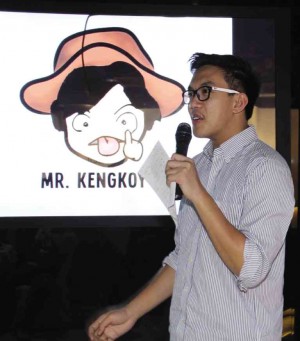
Mr. Kengkoy backpacks are produced by Hinabing Buhay, one of the first 10 groups to get prize money under Smart’s payITfwd program.
Social media, like any innovation or breakthrough, can be used for good or evil. It all depends on who is wielding such powerful tools.
In the case of some of the winners of the payITfwd contest of Internet giant Smart Communications Inc., social media such as Facebook, Twitter and Instagram are used to promote their social enterprise, linking their products with potential buyers outside their immediate community.
Hinabing Buhay, for example, is a school project at the Ateneo de Naga University that migrated from the classroom to the actual market. In the process, it gave livelihood to some 50 families in Albay.
According to Raphael Magno, managing director of Hinabing Buhay, the project was born out of a desire to provide sustainable livelihood to mothers from Albay, which has long been known for its abaca production and woven products.
Through Hinabing Buhay, mothers in Albay produce jute cloth or Mayon fabric and then sew them into backpacks under the brand Mr. Kengkoy, which appeals to the youth—the main market of the expanding line of abaca-based products.
To get the word out on its handmade products, the group of nine Ateneo de Naga students took to social media, and established an online shop where people from around the world can order.
Through social networks such as Facebook and Instagram, Magno says, the group was also able to create a buzz around Mr. Kengkoy—and send out the message, principally through www. Mrkengkoy.ph—that native did not mean kitschy.
From backpacks, which sell for about P1,300 apiece, Mr. Kengkoy will expand to pouches and small bags that students will appreciate, he says.
Julio Babagay, on the other hand, spearheaded the setting up of the Notebook Exchange project, a social entrepreneurship program aimed at combating the garbage problem in a community in Montalban by making notebooks from unused pages of discarded notebooks.
The third-year high school student says that, at the end of the school year, volunteers go around and collect discarded materials like pages from old notebooks. Then a number of mothers in the community sew them together while he and a partner design and make new covers.
According to Babagay, they realized that many of the notebooks thrown away still had a lot of unused pages. When gathered together, these pages could be turned into a brand new notebook to help those in need.
Through social networking, the Notebook Project started to reach out to possible buyers outside Montalban. The group also uses technology to check out new designs to improve the look of recycled notebooks.
Babagay says that, so far, the group has been able to sell 100 notebooks to a buyer in Canada, and through the winnings from the payITfwd initiative, the group hopes to be able to expand the project and produce more notebooks.
Hinabing Buhay and the Notebook Exchange project are just two of the 10 projects that stood out from among hundred of entries submitted to Smart during the first round last year of the payITfwd social development program.
The other top entries are General Santos-based Hearts and Brains Inc. ,which provides medical missions, feeding missions and livelihood assistance to marginalized sectors of the community; Kalibo Sakeros Football inc. that develops the love for football in the grassroots; Switotwins.com, a digital storytelling journal for kids; and Helping Other People Earn Project, which trains students in Iligan City on how to get online jobs to earn extra income.
Rounding up the top 10 are Rebirth Outdoor Trekkers, comprised of mountaineers who combine outdoor activities with community service; Rural Education and Cultural Outreach Program, an 18-man volunteer team that goes up the mountains of Negros Occidental to offer a two-day outreach program to impoverished communities; the virtual health centers of General Santos City-based Dr. Roel Z. Cagape; and the education project in Palawan of alternative learning teacher Reuben C. Herrera.
“Through payITfwd, Smart hopes to enable the spread of social good acts that foster learning using our technology. Through this, social good advocates can scale up so that more communities can benefit from their cause,” says Smart Public Affairs head Ramon Isberto.
The winners were each given five tablets and a technology grant of P50,000. Smart Bro will also enable connectivity to the devices with a Smart Pocket Wi-Fi and P3,000 worth of load credits.
“Technology can help increase efficiency in operations and expand the reach of these community-based projects. Most often than not, these social good deeds are done by volunteers with limited resources. With Smart’s technology solutions, we hope to help spread social good to keep the ‘good’ going,” he adds.